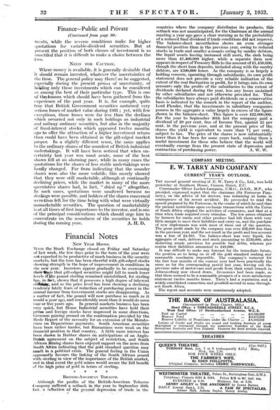NEED FOR CAUTION.
Where money is available, it is generally desirable that it should remain invested, whatever the uncertainties of the time. The general policy may theref3re be suggested, especially during the present period of uncertainty, of holding only those investments which can be considered as among the best of their particular type. This is one of theriessons which should have been gathered from the experience of the past year. It is, for example, quite true that British Government securities sustained very serious losses of market value during 1931 ; yet, with few exceptions, those losses were far less than the declines which occurred not only in such holdings as industrial and railway ordinary securities, but also in the majority of fixed-interest stocks which appeared twelve months ago to offer the attraction of a higher investment return than could have been obtained in the gilt-edged market proper. In a slightly different sense, the same applies to the ordinary shares of the soundest of British industrial undertakings. It will have been noticed that when un- certainty last year was most acute, some of the best shares fell at an alarming pace, while in many cases the quotations for the shares of less stable undertakings were hardly changed. Far from indicating that the sounder shares were also the more volatile, this merely showed that they were still marketable, although at continually declining prices, while the market in many of the more speculative shares had, in fact, " dried up " altogether. In such cases, quotations were unaltered because no dealings were possible. and holders of the shares concerned weresthus left for the time being with what were virtually unmarketable securities. The question of marketability is at all times of first importance to the investor, and is one of the principal considerations which should urge him to concentrate on the soundness of the securities he holds






































 Previous page
Previous page